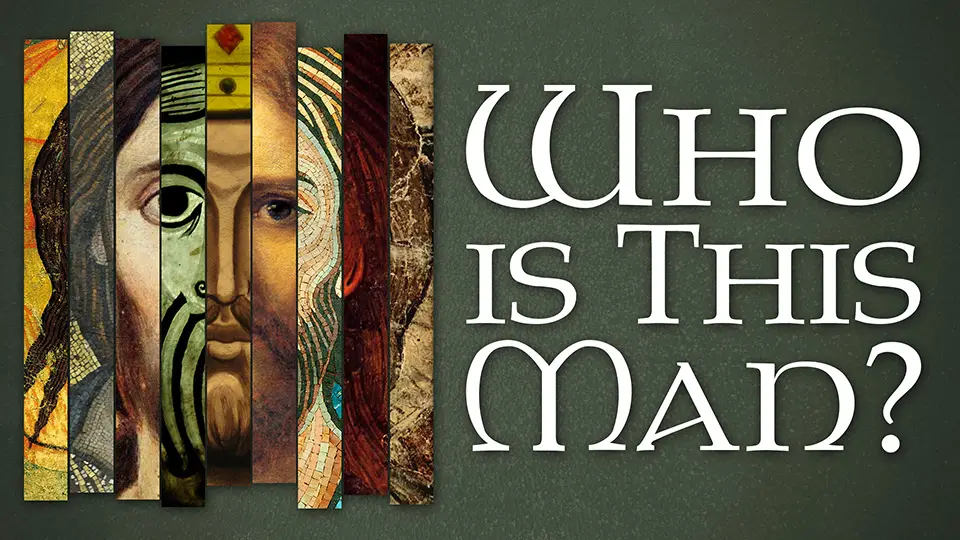Just who is Jesus? A Barna study conducted in 2014, revealed that 93 percent of Americans[1] believe that Jesus Christ “was a real person who actually lived.”[2] Sixty-three percent said they have made a commitment to Jesus that is still important in their lives today. However, less than half (43 percent) believe “Jesus was God living among humans.” But before someone cries Heretic!, let’s examine the Scriptures and consider why they might believe this.
An attentive reader will observe that Scripture consistently places Jesus in a category outside that of God. For example:
Acts 2:22 (NASB) “Men of Israel, listen to these words: Jesus the Nazarene, a man attested to you by God with miracles and wonders and signs which God performed through Him in your midst, just as you yourselves know—
Ephesians 1:2 (NASB) Grace to you and peace from God our Father and the Lord Jesus Christ.
Revelation 12:10 (NASB) Then I heard a loud voice in heaven, saying, “Now the salvation, and the power, and the kingdom of our God and the authority of His Christ have come, for the accuser of our brethren has been thrown down, he who accuses them before our God day and night.
Revelation 20:6 (NASB) Blessed and holy is the one who has a part in the first resurrection; over these the second death has no power, but they will be priests of God and of Christ and will reign with
Him for a thousand years.
God is the Father, while Jesus, a man, is the Christ. Notice also that Jesus is not only the Christ, he is God’s Christ, thus further emphasizing their distinction. In addition, we are told at least twenty times in Scripture that Jesus has a God.[3] For instance:
1 Peter 1:3 (NASB) Blessed be the God and Father of our Lord Jesus Christ, who according to His great mercy has caused us to be born again to a living hope through the resurrection of Jesus Christ from the dead
Romans 15:6 (NASB) so that with one accord you may with one voice glorify the God and Father of our Lord Jesus Christ.
Ephesians 1:17 (NASB) that the God of our Lord Jesus Christ, the Father of glory, may give to you a spirit of wisdom and of revelation in the knowledge of Him.
Revelation 1:6 (NASB) and He [Jesus] has made us to be a kingdom, priests to His God and Father—to Him be the glory and the dominion forever and ever. Amen.
Revelation 3:2 (NASB) ‘Wake up, and strengthen the things that remain, which were about to die; for I [Jesus] have not found your deeds completed in the sight of My God.
Of course, these passages and others like them, beg the question, If Jesus is God, how can he have a God and still be God? Confusing and contradictory, isn’t it? On the other hand, Scripture offers clarity on the matter. Whenever a determination is made, the Father is the only one specifically classified as God, while Jesus is repeatedly said to be the Christ. This finding affirms Jesus’ own statement that the Father is the “only true God” while he is the Christ whom God sent (John 17:1, 3).
Contrary to what many Christians believe, the term Christ and its Hebrew equivalent, Messiah, are not designations for deity. The synonymous terms literally mean anointed one, and they refer to someone who has been consecrated for service unto 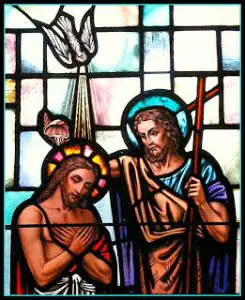 God. Professor of religion and philosophy, Douglas McCready, writes:
God. Professor of religion and philosophy, Douglas McCready, writes:
In biblical Judaism the term “messiah” did not necessarily carry any connotation of divine status, and Jews of Jesus’ day were not expecting their messiah to be other than human.[4] (emphasis added)
The word Christ is used over 500 times[5] in the New Testament to refer to Jesus, and is indicative of his role as God’s anointed king. This royal position, however, was not inherently his. Peter preached on the Day of Pentecost that it was God who made Jesus both Lord and Christ:
Acts 2:36 (NASB) “Therefore let all the house of Israel know for certain that God has made Him both Lord and Christ—this Jesus whom you crucified.” (emphasis added)
One would think that if Scripture put so much emphasis on identifying Jesus as the Christ–several hundred times–it would emphasize that he is deity all the more. However, we are never specifically told in Scripture that Jesus is God, God the Son, God-incarnate, or the second member of the Trinity. Those who hold to the supremacy of Scripture should find it troubling that the sacred texts clearly and repeatedly identity Jesus as the Christ, but not as God. Scholars agree that any kind of identification of Jesus as God is absent from Scripture. Bible professor and prolific author, William Barclay, states,
Time and time again the Fourth Gospel speaks of God sending Jesus into the world. Time and time again we see Jesus praying to God. Time and time again we see Jesus unhesitatingly and unquestioningly and unconditionally accepting the will of God for himself. Nowhere does the New Testament identify Jesus and God.[6] He said: “He who has seen me has seen God.” There are attributes of God I do not see in Jesus. I do not see God’s omniscience in Jesus, for there are things which Jesus did not know.”[7] (emphasis added)
And, according to Biblical scholar and popular author, N.T. Wright:
“Messiah”, or “Christ’, does not mean ‘the/a divine one”. It is very misleading to use the words as shorthands [sic] for the divine name or being of Jesus. It is comparatively easy to argue that Jesus…believed he was the Messiah. It is much harder, and a very different thing, to argue that he thought he was in some sense identified with Israel’s God. [8] (emphasis added)

It’s also significant that acclaimed Biblical scholar and author, James Dunn, writes in his exhaustive work, Christology in the Making, “We cannot claim that Jesus believed himself to be the incarnate Son of God…[9] (emphasis added)
Is Jesus Both God and Christ?
To call Jesus both God and Christ creates quite the conundrum. As already mentioned, if Jesus is God, how can he have a God? Furthermore, if Jesus is deity, it makes no sense for him to be anointed and empowered by God. On the contrary, it is God who empowers his servants. As author and professor, Bill Schlegel explains:
“Christ” (Hebrew, “Messiah”) means “anointed”. Grammatically, the word is an adjective with a passive sense. One who is anointed has been acted upon by someone else. The one doing the anointing is not the anointed. In the Bible, God is the Anointer, and the one whom God has anointed is the Christ (the Messiah). The Anointer is not the Anointed… To believe that Jesus is the Christ means to believe that Jesus is the one anointed by God. The Christ/Messiah in the Bible can’t be God, because it is God who chose and anointed the Christ.[10] (emphasis added)
In addition, how can Jesus be exalted to the position of Christ-King and given authority if he is already God? Isn’t God a higher position than that of even the highest king? Moreover, how can God be exalted to God’s right hand, a seat of delegated authority? If Jesus is God he would already the occupy the highest place and receive the greatest honor as deity. To be made Lord and Christ would be a demotion.
On the other hand, it makes sense that Jesus of Nazareth needed the anointing of God to do the work God had called him to do. Moreover, for Jesus to be exalted to God’s right hand as a reward for his obedience would be a true exaltation and great honor indeed (Philippians 2).
Some might contend that only Jesus’ human nature has a God, experienced exaltation and was granted authority to reign. However, this theory is nowhere to be found in Scripture. Rather, it was developed over time amidst fierce, protracted debates by the Hellenized Church Fathers. Professor of Theology, A.T. Hanson, states:
No responsible New Testament scholar would claim that the doctrine of the Trinity was taught by Jesus, or preached by the earliest Christians, or consciously held by any writer of the New Testament. It was in fact slowly worked out in the course of the first few centuries in an attempt to give an intelligible doctrine of God.[11] (emphasis added)
Indeed, the theory of Jesus’ dual natures did not become official Church dogma until the Council of Chalcedon in the 5th century.
The True Debate
Unlike the post-Biblical councils, the debate during Jesus’ ministry was not whether or not he was God, but whether or not he was the Christ:
 John 7:40-44 (NASB) Some of the people therefore, when they heard these words, were saying, “This certainly is the Prophet.” 41 Others were saying, “This is the Christ.” Still others were saying, “Surely the Christ is not going to come from Galilee, is He? 42 “Has not the Scripture said that the Christ comes from the descendants of David, and from Bethlehem, the village where David was?” 43 So a division occurred in the crowd because of Him. 44 Some of them wanted to seize Him, but no one laid hands on Him. (emphasis added)
John 7:40-44 (NASB) Some of the people therefore, when they heard these words, were saying, “This certainly is the Prophet.” 41 Others were saying, “This is the Christ.” Still others were saying, “Surely the Christ is not going to come from Galilee, is He? 42 “Has not the Scripture said that the Christ comes from the descendants of David, and from Bethlehem, the village where David was?” 43 So a division occurred in the crowd because of Him. 44 Some of them wanted to seize Him, but no one laid hands on Him. (emphasis added)
There were many who believed Jesus to be the promised Messiah sent by God, and they freely confessed it. For example, Martha, sister of Mary and Lazarus, acknowledged Jesus was the Christ:
John 11:27 (NASB) She *said to Him, “Yes, Lord; I have believed that You are the Christ, the Son of God, even He who comes into the world.” (emphasis added)
Some confusedly interpret the title, Son of God, to be a reference to some preexistent divine nature. However, a survey of the Bible reveals that, while there are many sons of God, it is ultimately a designation for the Messiah. Again, McCready clarifies the term for us:
While some have used the title Son of God to denote Jesus’ deity, neither the Judaism nor the paganism of Jesus’ day understood the title in this way. Neither did the early church.[12]
Wright agrees with McCready’s assessment:
…the phrase ‘son of God’ is systematically misleading because in pre- and non-Christian Judaism its primary referent is either Israel or the Messiah, and it retains these meanings in early Christianity…[13]
What did Jesus say?
Jesus’ own testimony was that he was the Christ:
John 4:25-26 (NASB) 25 The woman *said to Him, “I know that Messiah is coming (He who is called Christ); when that One comes, He will declare all things to us.” 26 Jesus *said to her, “I who speak to you am He.” (emphasis added)
John 10:24-25 (NASB) The Jews then gathered around Him, and were saying to Him, “How long will You keep us in suspense? If You are the Christ, tell us plainly.” 25 Jesus answered them, “I told you, and you do not believe; the works that I do in My Father’s name, these testify of Me. (emphasis added)
Despite certain so called proof texts, Jesus never claimed to be God. Millard Erickson, Baptist seminary professor and author, concedes the point:
It is true that Jesus did not make an explicit and overt claim to be deity. He did not say in so many words, “I am God.”[14] (emphasis added)
John’s Gospel
Ironically, we’ve been told that John’s gospel is unlike the Synoptic Gospels because, in it, he reveals the deity of Christ. However, John plainly states that the purpose for which he wrote his account was so that we might believe that Jesus is the Christ, not that we might believe he is God:
John 20:30-31 (NASB) Therefore many other signs Jesus also performed in the presence of the disciples, which are not written in this book; 31 but these have been written so that you may believe that Jesus is the Christ, the Son of God; and that believing you may have life in His name. (emphasis added)
Surely, the revelation of Jesus’ deity would have served as the greater motivation for writing his gospel than that of Jesus being the Christ. Yet, John’s stated purpose for writing is that we might believe Jesus is the chosen and anointed king.
What Others Believed
While there were some who did not accept that Jesus was the Christ, the demons knew exactly who he was:
Luke 4:41 (NASB) Demons also were coming out of many, shouting, “You are the Son of God!” But rebuking them, He would not allow them to speak, because they knew Him to be the Christ. (emphasis added)
Without question, the demonic spirits would have known if Jesus was the Almighty. But in every encounter Jesus had with demons, they never declared him to be God. On the contrary, they understood him to be the Nazarene, and the “holy one of God,” not God, the holy one.[15]
One of the most powerful and memorable declarations made regarding Jesus’ identity came from Peter via a revelation given to him by God the Father:
Matthew 16:15-17 and 20 (NASB) He [Jesus] *said to them, “But who do you say that I am?” 16 Simon Peter answered, “You are the Christ, the Son of the living God.” 17 And Jesus said to him, “Blessed are you, Simon Barjona, because flesh and blood did not reveal this to you, but My Father who is in heaven… 20 Then He warned the disciples that they should tell no one that He was the Christ. (emphasis added)
God said that Jesus was the Christ. God never identified Jesus as co-deity. In fact, in Luke’s rendering of the same event, Peter says that Jesus is the “Christ of God,” not God the Christ.[16] This divinely given revelation was to be kept private for the time being. The “secret,” however, was not that Jesus was God, but that he was the promised king.
Jesus’ Trial
But what about when Jesus was arrested and tried by Pilate. Wasn’t the charge brought against him that he claimed to be God? Not according to the Bible:
Matthew 26:63 (NASB) But Jesus kept silent. And the high priest said to Him, “I adjure You by the living God, that You tell us whether You are the Christ, the Son of God.” (emphasis added)
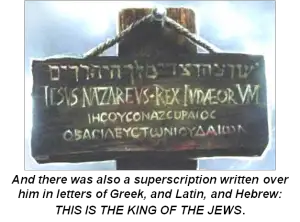 Luke 23:1-3 (NASB) Then the whole body of them got up and brought Him before Pilate. 2 And they began to accuse Him, saying, “We found this man misleading our nation and forbidding to pay taxes to Caesar, and saying that He Himself is Christ, a King.” 3 So Pilate asked Him, saying, “Are You the King of the Jews?” And He answered him and said, “It is as you say.” (emphasis added)
Luke 23:1-3 (NASB) Then the whole body of them got up and brought Him before Pilate. 2 And they began to accuse Him, saying, “We found this man misleading our nation and forbidding to pay taxes to Caesar, and saying that He Himself is Christ, a King.” 3 So Pilate asked Him, saying, “Are You the King of the Jews?” And He answered him and said, “It is as you say.” (emphasis added)
John 19:21 (NASB) So the chief priests of the Jews were saying to Pilate, “Do not write, ‘The King of the Jews’; but that He said, ‘I am King of the Jews.'” (emphasis added)
What’s more, as Jesus hung on the cross, he was mocked and taunted for claiming to be the Christ, the king of Israel, not for claiming to be deity:
Mark 15:29-32 (NASB) Those passing by were hurling abuse at Him, wagging their heads, and saying…30 save Yourself, and come down from the cross!” 31 In the same way the chief priests also, along with the scribes, were mocking Him among themselves and saying, “He saved others; He cannot save Himself. 32 “Let this Christ, the King of Israel, now come down from the cross, so that we may see and believe!” Those who were crucified with Him were also insulting Him. (emphasis added)
Luke 23:39 (NASB) One of the criminals who were hanged there was hurling abuse at Him, saying, “Are You not the Christ? Save Yourself and us!” (emphasis added)
Without a doubt, claiming to be God would have been the more serious offense, yet the charge brought against Jesus was that he and his followers said he was the Messiah.
The Post-Resurrection Message
Even after God exalted Jesus to His right hand, the message continued to be that he was the Christ, not that he was God incarnate. Every sermon preached or gospel message shared, whether it was to Jews or Greeks was not about Jesus being the God who died for the sins of the world. Rather it was always about Jesus being the Christ:
Acts 5:42 (NASB) And every day, in the temple and from house to house, they kept right on teaching and preaching Jesus as the Christ. (emphasis added)
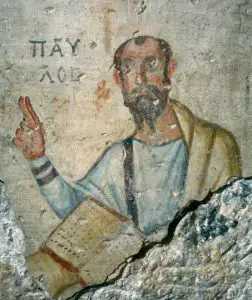
Paul never taught or attempted to prove that Jesus was God or God-incarnate. Rather, his ministry was consistently focused on proclaiming Jesus to be the Christ:
Acts 9:22 (NASB) But Saul [Paul] kept increasing in strength and confounding the Jews who lived at Damascus by proving that this Jesus is the Christ. (emphasis added)
Acts 17:2-3 (NASB) And according to Paul’s custom, he went to them, and for three Sabbaths reasoned with them from the Scriptures, 3 explaining and giving evidence that the Christ had to suffer and rise again from the dead, and saying, “This Jesus whom I am proclaiming to you is the Christ.” (emphasis added)
Acts 18:5 (NASB) But when Silas and Timothy came down from Macedonia, Paul began devoting himself completely to the word, solemnly testifying to the Jews that Jesus was the Christ. (emphasis added)
The reason God exalted Jesus to His right hand was because of his obedience, even in the face of a horrific death. What will Jesus’ reward be for his costly obedience? At the end of the age, will every knee will bow and declare once and for all that Jesus is God? No! Rather, that he is the Christ:
Philippians 2:9-11 (NASB) For this reason also, God highly exalted Him, and bestowed on Him the name which is above every name, 10 so that at the name of Jesus EVERY KNEE WILL BOW, of those who are in heaven and on earth and under the earth, 11 and that every tongue will confess that Jesus Christ is Lord, to the glory of God the Father. (emphasis added)
Not surprisingly, Apollos, a powerful, but lesser known preacher in the Bible, presented the same gospel message as that of Paul:
Acts 18:28 (NASB) 28 for he [Apollos] powerfully refuted the Jews in public, demonstrating by the Scriptures that Jesus was the Christ. (emphasis added)
What was it that the Scriptures demonstrated? That Jesus is God? No, rather that he is the Christ.
The disciples performed miracles and cast out demons by the name of Jesus the Christ and never by Jesus who is God:
Acts 3:6 (NASB) But Peter said, “I do not possess silver and gold, but what I do have I give to you: In the name of Jesus Christ the Nazarene—walk!” (emphasis added)
Acts 16:18 (NASB) She continued doing this for many days. But Paul was greatly annoyed, and turned and said to the spirit, “I command you in the name of Jesus Christ to come out of her!” And it came out at that very moment. (emphasis added)
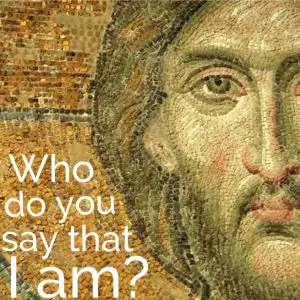 Who is this man from Nazareth? God incarnate? The second member of a triune deity? Or the Christ, sent by God? It depends on whether you answer according to fourth century orthodoxy or Scripture. The post-Biblical tradition says that we must believe Jesus is God in order to be saved. But according to Scripture, we are born again if we believe that Jesus is the Christ:
Who is this man from Nazareth? God incarnate? The second member of a triune deity? Or the Christ, sent by God? It depends on whether you answer according to fourth century orthodoxy or Scripture. The post-Biblical tradition says that we must believe Jesus is God in order to be saved. But according to Scripture, we are born again if we believe that Jesus is the Christ:
1 John 5:1 (NASB) Whoever believes that Jesus is the Christ is born of God, and whoever loves the Father loves the child born of Him. (emphasis added)
Who do you say he is?
[1] Barna used a representative sample of adults over the age of 18 in each of the 50 United States.
[2] “What Do Americans Think of Jesus: Man, Myth, or God?” The Christian Post, April 15, 2017, accessed 10-02-19.
[3] Messiah has a God: Micah 5:4; Psalm 45:6-7; Psalm 22;1; Psalm 89:26. Jesus has a God: Matthew 27:46 (2x); Mark 15:34 (2x); John 20:16-17; Romans 15:5-6; 2 Corinthians 1:2-3; 11:30-31; Ephesians 1:15-17; Hebrews 1:8-9; 1 Peter 1:3; Revelation 1:4-6; 3:2; 3:12 (4x).
[3] Mark 15:34
[4] Douglass McCready, He Came Down from Heaven: The Preexistence of Christ and the Christian Fatih, (IVP Academinc, 2005), p. 55.
[5] Christ (Jesus Christ, Christ the Lord, etc) is used of Jesus 503 times in the New Testament. Messiah is used two times (messias in Greek). Herbert Lockyer, All the Divine Names and Titles in the Bible, (Grand Rapids, MI: Zondervan Publishing House), 1975, p. 101-102; 104-105, and 206.
[6] Professor Barclay: “But we shall find that on almost every occasion in the New Testament on which Jesus seems to be called God there is a problem either of textual criticism or of translation.” William, Barclay, Jesus As They Saw Him: New Testament Interpretations of Jesus. (Grand Rapids: Wm. B. Eerdman’s Publishing, 1983), p. 21
[7] William Barclay, The Mind of Jesus, (Harper & Rowe, 1961), p. 56.
[8] N.T. Wright, “Jesus’ Self-Understanding” NTWrightPage – blog post accessed on 4-15-19 http://ntwrightpage.com/2016/04/05/jesus-self-understanding/
[9] James Dunn, Christology in the Making, (Wm. B. Eerdmans Publishing, 1996 ), p. 254.
[10] Bill Schlegel, “Do You Love God’s Child, The Person Who Believes Jesus is the Christ? Comments on 1 John 5:1,” Land and Bible, 9-27-91; accessed 9-27-91.
[11] Anthony Tyrrell Hanson, The Image of the Invisible God, (London: SCM Press, 1982), p.87.
[12] McCready, p. 56
[13] N.T. Wright, “Jesus’ Self-Understanding” NTWrightPage – blog post accessed on 4-15-19 http://ntwrightpage.com/2016/04/05/jesus-self-understanding/
[14] Millard J. Erickson, Introducing Christian Doctrine, (Grand Rapids, MI: Baker Academic, 1992, 2001)
[15] Luke 4:34.
[16] Luke 9:20.
